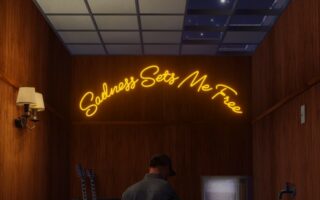
40 years on, there’s still no boundaries for Blancmange.
Even amongst the creative free-for-all that was the early eighties in British music, Neil Arthur and Stephen Luscombe’s Blancmange were outliers.
Formed in 1978, they were one of the first outfits to experiment with tape loops and primitive electronics, but it wasn’t until the release of their debut album Happy Families four years later that their intense, art school electronics made them Top Of The Pops regulars with tracks like Living On The Ceiling and Waves.
Two more modestly successful albums followed before the duo split, only for an unlikely reformation to take place twenty-five years later, celebrated with the release of Blanc Burn.
Luscombe then departed due to health reasons, but Arthur has since released ten further albums under the Blancmange moniker, as well as collaborating on side projects Near Future with Jez Bernholz (solo artist and collaborator with Gazelle Twin) and Fader with long-time collaborator Benge of Wrangler and Creep Show.
Whilst the recent Nil By Mouth series has focused more on ambient moods, Private View not only reunites Arthur with the London label for the first time since Happy Families was released, but also with that album’s guitarist David Rhodes, as well as the ever-present Benge.
For somebody so prolific there’s still a meticulousness to Arthur’s process however: “I have these ideas in my head but I won’t go into a studio until they are settled and I can let go of them,” he’s admitted, before adding: “I’m really lucky to be able make the music completely on my own terms.”
It’s a freedom many artists would long for, and one he doesn’t waste by limiting himself to what an audience’s expectations of a veteran might be.
Opener What’s Your Name sees his vocals twisted with ultra-modern processing. It’s a risky place to go, but by landing them in a time-hopping chimera of eighties’ and twenties’ riffs and patches, everything turns out fine.
It’s an outlier in truth though, with much of the rest of the material curated from the accretion of four decade’s worth of personal and professional experiences.
On Reduced Voltage for example, the often-misdirected fascination with humans and machines as extensions of each other resurfaces, manifesting itself on a track which works through an analog, minimalist chug.
Elsewhere, the melancholy note to self of the title-track is, it’s writer claims, ‘a kind of spy hole looking back at scenes, thoughts and desires, in order to find a way forward’.
Well-listened students of the genre might also point to some familiar, and in some cases surprising, threads to draw on.
Here We Go Go for instance sees Arthur stray into the territory of near-operatic pomp which Ultravox’s Midge Ure traversed on Vienna, whilst Everything Is Connected has a strain of Cabaret Voltaire’s Dadaist menace as he sings about taking the washing out and a distant memory of Donald Campbell’s crash on Lake Coniston.
Either might be finding what you want to find, but it’s the closer Take Me however that steps further, the singer operating in the mode of a less downcast Ian Curtis, an admittedly abstract foretelling of how a decade he barely saw might’ve shaped his music.
Other than a label, anybody looking for synergistic qualities between Private View and Happy Families is engaging in a futile exercise, and with Arthur intent on continuing to make the most of his rarely free form opportunity, they aren’t even likely to form career bookends.
Still crazy? No. But still no ceiling, either.




